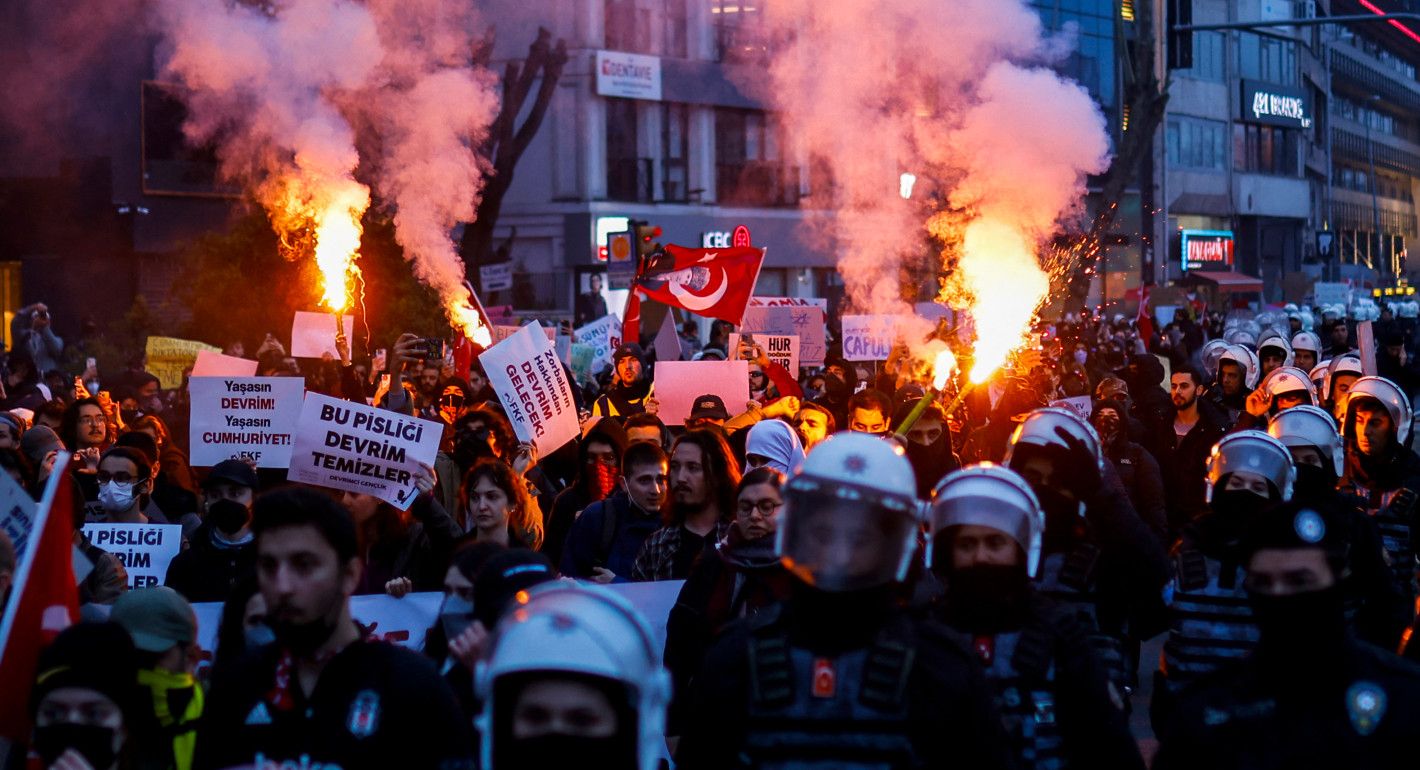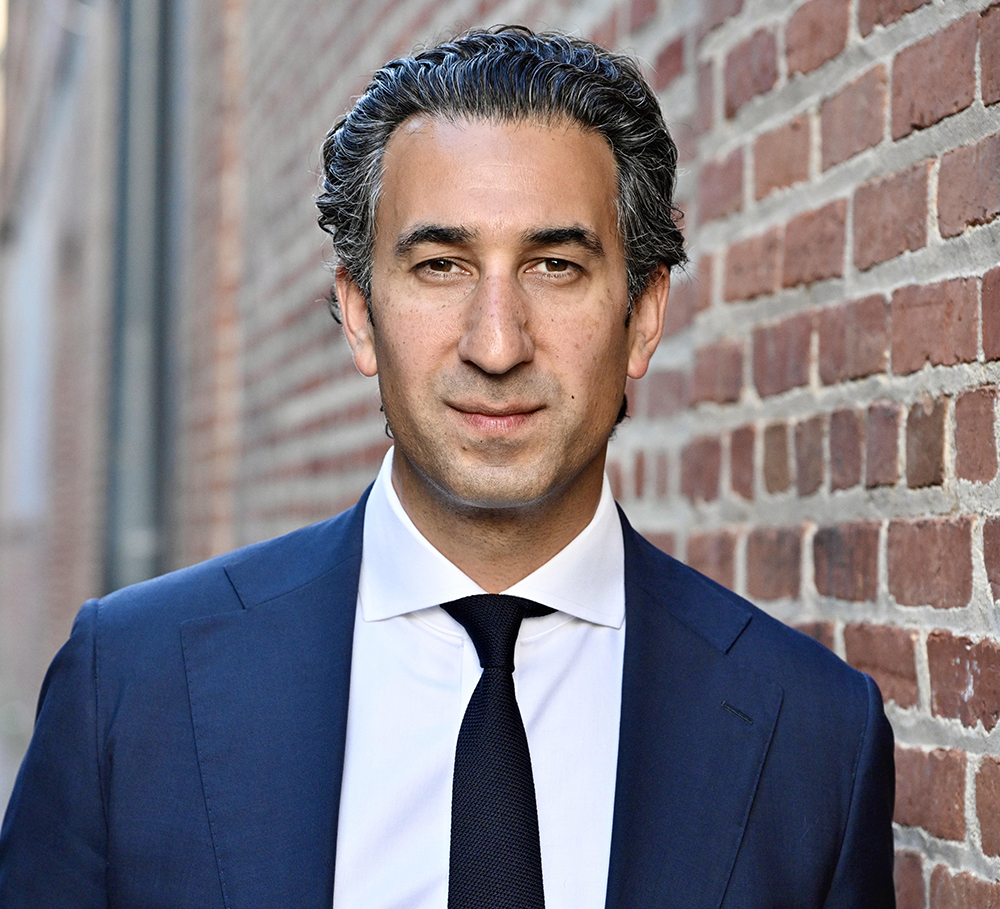Venezuelans deserve to participate in collective decisionmaking and determine their own futures.
Jennifer McCoy
{
"authors": [
"Andrew O’Donohue"
],
"type": "commentary",
"blog": "Emissary",
"centerAffiliationAll": "",
"centers": [
"Carnegie Endowment for International Peace"
],
"collections": [
"Global Democracy"
],
"englishNewsletterAll": "",
"nonEnglishNewsletterAll": "",
"primaryCenter": "Carnegie Endowment for International Peace",
"programAffiliation": "",
"programs": [
"Democracy, Conflict, and Governance"
],
"projects": [],
"regions": [
"Türkiye"
],
"topics": [
"Democracy",
"Domestic Politics"
]
}
Protesters in Istanbul on March 24, 2025. (Photo by Kemal Aslan/AFP via Getty Images)
As the regime ratchets up repression, two factors work in its favor—but protests and increased international pressure offer hope for democracy.
Last Wednesday, the government of Turkish President Recep Tayyip Erdoğan sharply increased its use of repression by arresting the leading voice of the opposition, Istanbul Mayor Ekrem İmamoğlu, and banning popular protests. As tens of thousands of protesters have mobilized nationwide in defiance, Türkiye’s regime has cracked down harder, detaining more than a thousand demonstrators, arresting journalists, and jailing İmamoğlu.
These events represent a dangerous inflection point between democracy and full authoritarianism for Türkiye’s already repressive regime. Since 2015, Türkiye has been a textbook example of what political scientists call a competitive authoritarian regime: a system in which the government’s abuse of state power tilts the playing field of political competition in its favor. But until now, Erdoğan had refrained from crossing the Rubicon of arresting his main rival. İmamoğlu, who was named on Monday as the main opposition party’s presidential candidate, consistently outperforms Erdoğan in public opinion polls.
The key question now facing Türkiye is whether Erdoğan’s gambit to repress the opposition will succeed—or whether societal and international pressure can force the regime to reverse its course. Troublingly, the best research in political science by scholars Steven Levitsky and Lucan Way suggests that two factors work strongly in the regime’s favor: an international environment permissive of repression and the ruling party’s vast sway over state institutions. But one key variable cuts in favor of the opposition: mass societal protests that have surprised Türkiye’s regime with their speed and scale and that could galvanize Türkiye’s state institutions and the international community to support democratization.
The first factor that enables Erdoğan’s escalating repression is geopolitical: Türkiye’s Western allies have been increasingly unable or unwilling to apply pro-democratic pressure. The president of the European Commission, Ursula von der Leyen, has called İmamoğlu’s arrest “deeply concerning.” Yet the European Union thus far has not imposed significant costs, such as sanctions on Turkish government officials, in response to this repression, almost certainly due to Ankara’s geopolitical leverage.
Especially as the new U.S. administration has shown it would withdraw support for Ukraine, the EU increasingly depends on Türkiye as a military partner. Earlier this month, Erdoğan signaled that Ankara could send peacekeeping troops to Ukraine. And since 2016, the EU has relied heavily on Türkiye for cooperation on limiting migration to Europe: Türkiye hosts more than 3 million registered Syrian refugees.
Across the Atlantic, the new U.S. administration has scantinterest in criticizing allies’ transgressions against democracy. In 2022, when a Turkish court convicted İmamoğlu in a separate, highly politicized case, the U.S. State Department expressed that it was “gravely concerned and disappointed” by the verdict. The State Department has issued no such statement to date on the current situation.
Instead, the administration is effectively giving a green light to Türkiye’s repression. Last Friday, just days after İmamoğlu’s detention, U.S. special envoy Steve Witkoff described President Donald Trump’s recent phone call with Erdoğan as “great.” On Tuesday, Secretary of State Marco Rubio met his Turkish counterpart in Washington to discuss warmer ties and made only brief mention of “concerns regarding recent arrests and protests in Türkiye.”
The second card in Erdoğan’s hand is domestic: Türkiye’s government wields control of a well-organized, coercive state apparatus. Erdoğan and his Justice and Development Party, or AKP, have held power for more than two decades. By purging and packing state institutions, they have acquired vast influence over Türkiye’s judiciary, police, and military. Absent major pressure from pro-democratic protests, these institutions are likely to uphold the regime’s repression.
Consider Erdoğan’s control over Türkiye’s courts. After an attempted coup in July 2016, Türkiye’s government purged more than 4,000 judges—almost 30 percent of all judges in the country—and often replaced them with Erdoğan loyalists. Erdoğan’s party has appointed all the justices on Türkiye’s highest court. As one current Turkish judge told me in an interview, “We are walking a tightrope; we can’t ignore who has political power.”
In similar fashion, Erdoğan has achieved dominance over Türkiye’s police and military. After Türkiye’s 2016 coup attempt, the regime fired almost 9,000 police officers, detained over 10,000 soldiers, and dismissed or jailed nearly half of Türkiye’s top generals. Türkiye’s police and military, under normal circumstances, are more likely to comply with Erdoğan’s coercion than to resist orders from the top.
Erdoğan’s grip over the state, coupled with international acquiescence, enables him to place acute pressure on Türkiye’s media not to cover the protests or repression of protesters. Turkish authorities have detained seven journalists, and Turkish courts have ordered the social media platform X to restrict more than 700 accounts, including the account of an independent media site. The platform has complied but says it will legally challenge the orders—in Turkish courts that lack independence.
Even with the international environment and Türkiye’s state institutions stacked in Erdoğan’s favor, one factor offers hope of preventing the country from sliding into full authoritarianism: societal mobilization. As political scientists Steven Levitsky and Daniel Ziblatt argue, when autocratic leaders have weakened institutional safeguards for democracy, societal protest is the final barrier to authoritarian rule.
In the days since İmamoğlu’s arrest, Türkiye has experienced a protest cascade—a process by which the courageous, high-risk actions of early protesters create a critical mass that snowballs into a large-scale social movement. Despite a ban on protests, tens of thousands of citizens have mobilized across Türkiye’s cities, at universities nationwide, and at the main opposition’s headquarters in Istanbul. Although the public has protested before against Erdoğan’s government, most notably in the Gezi Park protests of 2013, something is different this time: İmamoğlu is a charismatic, unifying leader for the movement and has the backing of an opposition party that controls six of Türkiye’s seven largest cities.
These large-scale protests matter not because they will influence Erdoğan himself but rather because they could spark a wave of defections within Türkiye’s regime. The day after his arrest, İmamoğlu called upon the “honorable and ethical prosecutors and judges of the Supreme Turkish Judiciary who serve with love for their nation.” “You must take action,” İmamoğlu urged. By repressing his main rival, Türkiye’s long-serving president has crossed a red line, and societal mobilization is now the best hope of preventing Erdoğan’s allies from crossing with him.
Sustained societal pressure also matters because it can mobilize Türkiye’s Western allies to condemn Erdoğan’s repression. As the crackdown has escalated, the European Commission urged Ankara on Monday to “uphold democratic values.” Türkiye’s sustained civic mobilization offers the possibility of a boomerang effect, whereby Türkiye’s protestors can mobilize Western civil society to pressure their own governments to stand up for democracy in Türkiye.
Since its first multiparty elections in 1946, Türkiye has long prided itself on being a country in which the national will, or milli irade in Turkish, is supreme. Erdoğan himself skillfully tapped into this sentiment to rise to power in the 2000s. After Erdoğan, then the mayor Istanbul, was imprisoned in 1999, this repression only increased his popularity. Today, Erdoğan’s own abuse of state power may be writing a similar narrative for his main rival. Although the international environment and the ruling party’s grip on state power work in Erdoğan’s favor, the mass protests offer hope of a crack in the regime, increased international pressure, and ultimately democratization for Türkiye.
Carnegie does not take institutional positions on public policy issues; the views represented herein are those of the author(s) and do not necessarily reflect the views of Carnegie, its staff, or its trustees.
Venezuelans deserve to participate in collective decisionmaking and determine their own futures.

Jennifer McCoy
A conversation with Karim Sadjadpour and Robin Wright about the recent protests and where the Islamic Republic might go from here.



Aaron David Miller, Karim Sadjadpour, Robin Wright
When democracies and autocracies are seen as interchangeable targets, the language of democracy becomes hollow, and the incentives for democratic governance erode.


Sarah Yerkes, Amr Hamzawy
Carnegie scholars examine the crucial elements of a document that’s radically different than its predecessors.



James M. Acton, Saskia Brechenmacher, Cecily Brewer, …
Trump’s unmatched leverage over Netanyahu gives the prime minister little room to maneuver.


Aaron David Miller, Daniel C. Kurtzer